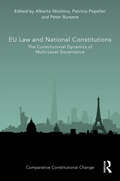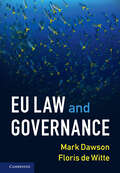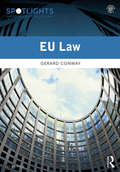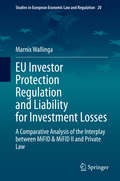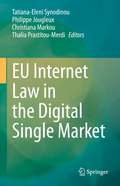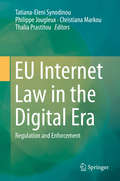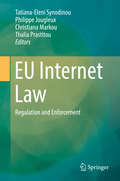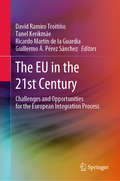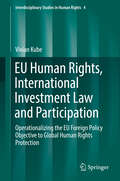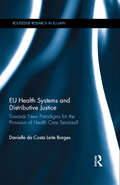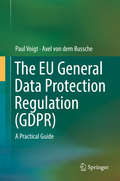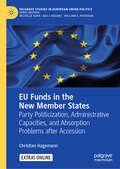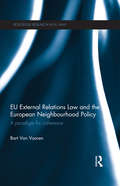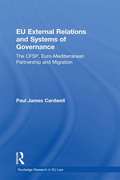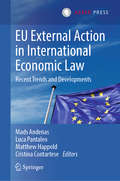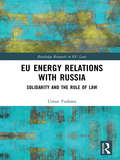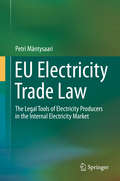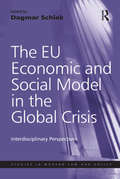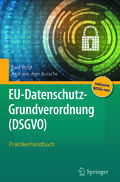- Table View
- List View
EU Law and National Constitutions: The Constitutional Dynamics of Multi-Level Governance (Comparative Constitutional Change)
by Alberto Nicòtina, Patricia Popelier and Peter BursensThis book provides an in-depth guide to researchers and practitioners who are interested in analyzing the evolution of EU law from a national and comparative constitutional law perspective. The volume deals with questions of how EU Member States’ constitutional systems, including the subnational tier, interact with the supranational level. It maps the evolution over time of constitutional strategies in the face of multi-level governance and individuates contextual factors on an empirical basis. The volume includes twelve national reports written by leading experts in constitutional and EU law, and in political science. The countries discussed include the six founding Member States, together with a selection of Member States in which a clear-cut evolution in the national constitutional approach towards the EU can be observed. These include the Czech Republic, Denmark, Hungary, Poland, Portugal and the United Kingdom. The latter is included as an “extreme” case in which the change in constitutional strategy over time has resulted in withdrawing from the Union altogether. Taken together, the book assembles the building blocks of an explanatory theory of constitutional strategies in the face of multi-level governance. The volume will be of interest to students and researchers in comparative constitutional law, political science and multidisciplinary EU studies. It will also be a valuable resource for policy-makers.
EU Law and Governance (Cambridge Studies In European Law And Policy Ser.)
by Mark Dawson Floris de WitteWhat is the EU for? In light of the current state of European integration, EU law cannot meaningfully be appreciated without understanding the political, social and cultural context within which it operates. This textbook proposes a fresh, accessible and interdisciplinary take on the subject that is suitable for one-semester and introductory courses wishing to engage the reader with the wider context of the EU project. It situates the institutions, legal order and central policy domains of the EU in their context and offer students the tools to critically analyse and reflect on European integration and its consequences. With pedagogical features such as further reading, class questions and essay/exams questions to support learning, this textbook enables students to form their own informed opinion on whether the EU offers an appropriate answer to the many questions that it is asked.
EU Law (Spotlights)
by Gerard ConwayEU Law provides a comprehensive examination of the law of the European Union in two distinct parts, covering the institutions, structure and processes of the EU as well as the substantive law, as enacted by the Lisbon Treaty. Beginning by examining its origins, Conway locates EU Law within both an international and a domestic legal context. He then explores the evolution of EU Law before providing a clear and accessible account of the structure and internal and international workings of the EU and the special role of the European Court of Justice. The second half of the book explores the Four Freedoms (of Goods, Workers, Capital and Movement) and provides a detailed account of Competition Law and the Economic and Social contexts. The Routledge Spotlights series brings a modern, contemporary approach to the core curriculum for the LLB and GDL which will help students Move beyond an understanding of the law Refine and develop the key skills of problem-solving, evaluation and critical reasoning which are essential to exam success Discover sources and suggestions for taking your study further By focusing on recent case law and real-world examples, Routledge Spotlights will help you shed light on the law, understand how it operates in practice and gain a unique appreciation of the contemporary context of the subject. Companion Website This book is supported by a range of online resources developed to support your learning, keep you up-to-date and to help you prepare for assessments, including: Key Case Flashcards to aid with recall Quizzes and practice questions
EU Law (Longman Law Ser.)
by Iyiola SolankeThe Court of Justice of the European Union is the busiest court in the world. The second edition of this textbook explores why this is. It examines in detail the interactions between European Union and national institutions, instruments, laws and concepts that make up this unique legal order. It explains the core constitutional and substantive principles that underpin the European Union legal order, and introduces EU law in a detailed, comprehensive way which is both enjoyable and clear to read. It offers an up-to-date and accessible analysis of EU law and avoids technical jargon, providing informed insights on an exciting but challenging subject. Combining a historical perspective with up-to-date examples, it aims to help students appreciate how EU law developed and its continued significance in day-to-day life. This updated edition features new coverage on free movement, online resources plus additional chapters on Article 50 and EU law in the UK after Brexit.
EU Law (Key Facts Key Cases)
by Chris TurnerKey Facts Key Cases: EU Law will ensure you grasp the main concepts of your EU Law module with ease. This book explains the facts and associated case law for: The constitution of EU law, its institutions, the sources of EU law and the means of enforcement The relationship with national law The law of the single market EU competition law EU discrimination law and other social policy Key Facts Key Cases is the essential series for anyone studying law at LLB, postgraduate and conversion courses. The series provides the simplest and most effective way to absorb and retain all of the material essential for passing your exams. Each chapter includes: diagrams at the start of chapters to summarise key points structured headings and numbered points to allow for clear recall of the essential points charts and tables to break down more complex information Chapters are also supported by a Key Cases section which provides the simplest and most effective way to absorb and memorise essential cases needed for exam success. Essential and leading cases are explained The style, layout and explanations are user friendly Cases are broken down into key components by use of a clear system of symbols for quick and easy visual recognition
EU Investor Protection Regulation and Liability for Investment Losses: A Comparative Analysis of the Interplay between MiFID & MiFID II and Private Law (Studies in European Economic Law and Regulation #20)
by Marnix WallingaThis book examines the relationship between the EU investor protection regulations enshrined in MiFID and MiFID II and national contract and torts law. It describes how the effect of the conduct of business rules as implemented in national financial supervision legislation in private law extends to the issue of enforcement, and critically assesses this interaction from the perspective of EU law. In particular, the conclusions identified in the book will deepen readers’ understanding of the interplay between the conduct of business rules and private law norms governing a firm’s liability to pay damages, such as duty of care, attributability of damage, causation, contributory negligence and limitation. In turn, the book identifies the subordination and the complementarity model to conceptualise the interaction between the conduct of business rules and private law norms. Moreover, the book challenges the view that civil courts are – or should be – forced to give private law effects to violation of the MiFID and MiFID II conduct of business rules in line with the subordination model. Instead, the complementarity model is advanced as the preferred approach to this interaction in view of what MiFID and MiFID II require from Member States in terms of their implementation, as well as the desirability of each model. This model presupposes that courts should consider the conduct of business rules when adjudicating individual disputes, while preserving the autonomy of private law norms governing liability of investment firms towards clients. Based on analysis of case law of courts in Germany, the Netherlands and England & Wales, as well as scholarly literature, the book also compares the available causes of action, the conditions of liability and the obstacles investors face when claiming damages, as well as how and the extent to which investors can benefit from the conduct of business rules in clearing these obstacles. In so doing, under the approach adopted by national courts to the interplay between the conduct of business rules of EU origin and private law, the book shows how investors can benefit from the influence of these rules on private law norms. In closing, it demonstrates a hybridisation of private law remedies resulting from the accommodation of the conduct of business rules into the private law discourse according to the complementarity model, illustrating how judicial enforcement through private law means may contribute to investor protection.
EU Internet Law in the Digital Single Market
by Tatiana-Eleni Synodinou Philippe Jougleux Christiana Markou Thalia Prastitou-MerdiWith the ongoing evolution of the digital society challenging the boundaries of the law, new questions are arising – and new answers being given – even now, almost three decades on from the digital revolution. Written by a panel of legal specialists and edited by experts on EU Internet law, this book provides an overview of the most recent developments affecting the European Internet legal framework, specifically focusing on four current debates. Firstly, it discusses the changes in online copyright law, especially after the enactment of the new directive on the single digital market. Secondly, it analyzes the increasing significance of artificial intelligence in our daily life. The book then addresses emerging issues in EU digital law, exploring out of the box approaches in Internet law. It also presents the last cyber-criminality law trends (offenses, international instrument, behaviors), and discusses the evolution of personal data protection. Lastly, it evaluates the degree of consumer and corporate protection in the digital environment, demonstrating that now, more than ever, EU Internet law is based on a combination of copyright, civil, administrative, criminal, commercial and banking laws.
EU Internet Law in the Digital Era: Regulation and Enforcement
by Tatiana-Eleni Synodinou Philippe Jougleux Christiana Markou Thalia PrastitouThe book provides a detailed overview and analysis of important EU Internet regulatory challenges currently found in various key fields of law directly linked to the Internet such as information technology, consumer protection, personal data, e-commerce and copyright law. In addition, it aims to shed light on the content and importance of various pending legislative proposals in these fields, and of the Court of Justice of the European Union’s recent case law in connection with solving the different problems encountered. The book focuses on challenging legal questions that have not been sufficiently analyzed, while also presenting original thinking in connection with the regulation of emerging legal questions. As such, it offers an excellent reference tool for researchers, policymakers, judges, practitioners and law students with a special interest in EU Internet law and regulation.
EU Internet Law
by Tatiana-Eleni Synodinou Philippe Jougleux Christiana Markou Thalia PrastitouThis book provides an overview of recent and future legal developments concerning the digital era, to examine the extent to which law has or will further evolve in order to adapt to its new digitalized context. More specifically it focuses on some of the most important legal issues found in areas directly connected with the Internet, such as intellectual property, data protection, consumer law, criminal law and cybercrime, media law and, lastly, the enforcement and application of law. By adopting this horizontal approach, it highlights - on the basis of analysis and commentary of recent and future EU legislation as well as of the latest CJEU and ECtHR case law - the numerous challenges faced by law in this new digital era. This book is of great interest to academics, students, researchers, practitioners and policymakers specializing in Internet law, data protection, intellectual property, consumer law, media law and cybercrime as well as to judges dealing with the application and enforcement of Internet law in practice.
The EU in the 21st Century: Challenges and Opportunities for the European Integration Process
by Tanel Kerikmäe David Ramiro Troitiño Ricardo Martín de la Guardia Guillermo Á. Pérez SánchezIn the light of Brexit, the migration crisis, and growing scepticism regarding the European integration process, this book offers a comprehensive overview of the most pressing problems facing the European Union in the 21st century. Written by experts from various disciplines, the contributions cover a wide range of economic, legal, social and political challenges, including populism, migration, Brexit, and EU defence, foreign policy and enlargements. Each paper includes a historical account, insights into the problems and challenges confronting the EU, and an assessment of the institutions and policy instruments applied by the EU in response. Discussing each of the problems as part of a process – including the historical roots, current situation and potential solutions – the book allows readers to gain an understanding of the European Union as a living project.
The EU in International Sports Governance: A Principal-agent Perspective Of Eu Control Of Fifa And Uefa (The European Union in International Affairs)
by Arnout GeeraertThis book demonstrates that the European Union (EU) can curtail the autonomy of FIFA and UEFA by building upon insights from the principal-agent model. The author argues that EU institutional features complicate control, but do not render the EU powerless, and that FIFA and UEFA can deploy a variety of strategies to mitigate control.
EU Human Rights, International Investment Law and Participation: Operationalizing the EU Foreign Policy Objective to Global Human Rights Protection (Interdisciplinary Studies in Human Rights #4)
by Vivian KubeThis book demonstrates how human rights obligations of the EU foreign constitution can be operationalized in the realm of international economic regulation. The content is divided into three major parts. The first outlines the legal foundations needed for the EU to become a shaper of international investment law, which include the general principles and objectives of EU external policies, the Charter of Fundamental Rights, international human rights and the international investment competences of the EU. The second part demonstrates the current international investment regime’s incompatibility with human rights interests, while the third analyzes two mechanisms stemming from trade Law – ex-ante human rights impact assessments and civil society monitoring bodies – and explores whether they could mitigate the current inequalities in the protection of rights. The potential of these mechanisms, the book argues, lies in their capacity to ensure a comprehensive assessment of all interests at stake, and to empower traditionally marginalized rights-holders to make, shape and contest the international investment regime.
EU Health Systems and Distributive Justice: Towards New Paradigms for the Provision of Health Care Services? (Routledge Research in EU Law)
by Danielle Da Costa Leite BorgesEU Health Systems and Distributive Justice uses theories of distributive justice to examine tensions created by the application of the Internal Market rules to the provision of health care services within the European Union. Using the concepts and principles embedded in the theories of egalitarianism and libertarianism, this book analyses the impact of the Internal Market rules on common values and principles shared by European health systems, such as universality, accessibility, equity and solidarity. This analysis is conducted using the specific issue of cross-border health care. This book makes innovative contributions to the study of the relationship between EU health systems and the Internal Market – it encompasses the analysis of all principles recognised by EU institutions as guiding principles of European health systems; it integrates human rights law and practice into the discussion of the EU Court of Justice’s approach to patient mobility cases; and it assesses the potential impact of the Internal Market over EU health systems through the lens of distributive justice, looking at the underlying principles of these systems that are mostly concerned with social justice. Ultimately, this is not a book on EU law and health care, but it is a book on distributive justice, health care and the principles and policies guiding European health systems.
The EU General Data Protection Regulation (GDPR)
by Paul Voigt Axel von dem BusscheThis book provides expert advice on the practical implementation of the European Union’s General Data Protection Regulation (GDPR) and systematically analyses its various provisions. Examples, tables, a checklist etc. showcase the practical consequences of the new legislation. The handbook examines the GDPR’s scope of application, the organizational and material requirements for data protection, the rights of data subjects, the role of the Supervisory Authorities, enforcement and fines under the GDPR, and national particularities. In addition, it supplies a brief outlook on the legal consequences for seminal data processing areas, such as Cloud Computing, Big Data and the Internet of Things.Adopted in 2016, the General Data Protection Regulation will come into force in May 2018. It provides for numerous new and intensified data protection obligations, as well as a significant increase in fines (up to 20 million euros). As a result, not only companies located within the European Union will have to change their approach to data security; due to the GDPR’s broad, transnational scope of application, it will affect numerous companies worldwide.
EU Funds in the New Member States: Party Politicization, Administrative Capacities, And Absorption Problems After Accession (Palgrave Studies in European Union Politics)
by Christian HagemannThis book examines new member states’ problems with the absorption of EU funds. Since accession, many new member states from Central and Eastern Europe struggle to access their billions of development funds from Brussels. While existing research mostly emphasizes the role of states’ administrative capacities to account for absorption problems, this study adds the so far neglected role of politics as party politicization to the equation. The argument is tested using a combination of fuzzy-set Qualitative Comparative Analysis (fsQCA) with two detailed process tracing case studies. This book will appeal to scholars interested in EU cohesion policy, post-accession compliance, and post-communist politics.
EU External Relations Law and the European Neighbourhood Policy: A Paradigm for Coherence (Routledge Research in EU Law)
by Bart Van VoorenThe European Neighbourhood Policy (ENP) is a recent example of an external EU policy drawn up explicitly with the objective of achieving coherence in the external policies of the EU and its Member States. Positioning the ENP in the legal-historical context of political union, this book explains why coherence has become a substantive issue in EU external relations, and why law is integral to attaining the ever-enigmatic single voice of the European Union. The text examines the role of EU external relations law in attaining a coherent neighbourhood policy and goes on to undertake an in depth analysis of the ENP, arguing that the innovative nature of the ENP in regard to coherence lies beyond the narrowly defined legal sphere, and stems primarily from its hybrid composition of hard legal, soft legal and non-legal policy instruments. Adopting an interdisciplinary approach by integrating elements of law, history and political science, EU External Relations Law and the European Neighbourhood Policy is unique in its approach to the subject. This book will be of particular interest to academics and students of EU Law, Political Science, History and International Relations as well as to practitioners engaged in the process of drafting coherent external policy.
EU External Relations Law and Policy in the Post-Lisbon Era
by Paul James CardwellThis is a collection of works which considers the many different facets of the EU's increasingly important engagement with the world beyond its borders. The Treaty of Lisbon marked a change in the powers and competences endowed on the EU - the contributions to this collection consider both the direct and indirect impact of the Treaty on the contemporary state of EU external relations. The authors are drawn from legal, political science and international relations disciplines and consider innovations or changes brought about by the Treaty itself: the European External Action Service, the roles of the High Representative and President, the collapse of the 'pillar' structure and new competences such as those for foreign investment. Other chapters cover developments which reflect the latest incremental changes upon which the post-Lisbon Treaty arrangements have some bearing, including the COREU network, the transatlantic and neighbourhood relations and the external dimension of 'internal' security. Useful for academics working in the field of EU external relations law and foreign policy, as well as the EU law/politics/European studies market more generally.
EU External Relations Law: Shared Competences and Shared Values in Agreements Between the EU and Its Eastern Neighbourhood
by Stefan Lorenzmeier Roman Petrov Christoph VedderThe book covers contributions from 18 authors from different countries and analyses the recent case law of the ECJ on the external competences of the European Union. It deals with the impact of EU values on its relations with the Eastern neighbouring countries. The first part focuses on the evolution and current challenges of the external actions of the European Union, while the second part presents the EU cooperation with its Eastern neighbourhood and Eurasia. The book addresses the Association Agreements with the countries of the Eastern Partnership with its Eastern neighbourhood and Eurasia, the enhanced Partnership Agreements in the Eastern neighbourhood and post-Soviet area, and the current and future contractual relations with Eurasian Economic Union and its member states.
EU External Relations Law
by Bart Van Vooren Ramses A. WesselRecent developments in both the EU and the global legal order call for a reassessment of the role of international law within the European Union. International Law as Law of the European Union explores how, and to what extent, international law still forms part of, and plays a role in, the current legal order of the European Union. Recent case law of the European Court of Justice prompted both scholars and practitioners to reconsider the relationship between EU law and international law. This volume reveals the practical development and consequences of this relationship, and places it in a conceptual framework by pointing to key arguments in the current debate. International Law as Law of the European Union thus forms an essential guide for academics, students and practitioners interested in the impact of new case law and conceptual thinking on the relationship between EU and international law.
EU External Relations and Systems of Governance: The CFSP, Euro-Mediterranean Partnership and Migration (Routledge Research in EU Law)
by Paul James CardwellThis book takes a fresh look at the external relations of the European Union (EU) and in particular the Common Foreign and Security Policy (CFSP). Rather than focusing exclusively on the competence aspects of the institutions and actors, the book makes the case that the CFSP can be understood as a system of governance, which produces effects beyond the traditional tools associated with foreign policy. The theoretical approach draws on insights from new institutionalism, constructivism and the institutional theory of law and emphasises how the institutionalised forms of cooperation in the external sphere contribute to a social reality in which the ‘added value’ of the CFSP can be seen. Paul James Cardwell takes the Euro-Mediterranean Partnership (EuroMed) as a case study. Not initially a CFSP project, EuroMed has become the frame for EU foreign policy in the region as an emerging system of governance in which the EU institutions play a central role. Having recently been relaunched as the Barcelona Process: Union for the Mediterranean, it is a topical subject. With the increasing importance of migration on the EU’s agenda, the book looks at the relationship between migration, EuroMed and the CFSP and argues that the legal effects of the CFSP can be felt beyond the Treaty-based instruments. EU External Relations and Systems of Governance will be of interest to students and scholars of Law, Politics and European studies researching in the dynamic fields of EU external relations and foreign policy, as well as policy-makers and non-governmental organisations striving to better understand how the EU and its systems of governance operate.
EU External Action in International Economic Law: Recent Trends and Developments
by Mads Andenas Luca Pantaleo Matthew Happold Cristina ContarteseThe topic of this book is the external action of the EU within international economic law, with a special focus on investment law. The aim of the volume is to provide the reader with an appraisal of the most recent trends and developments that have characterised a field that has been rapidly evolving and in which the EU has imposed itself as a leading actor.The book is aimed at academics, practitioners and graduate students as well as at EU officials and judges, all of whom should find the subject matter discussed useful for keeping updated on a scholarly discussion of relevance to case law.Mads Andenas is Professor of Law at the Faculty of Law of the University of Oslo in Norway. Luca Pantaleo is Doctor of Law and Senior Lecturer in International and European Law at The Hague University of Applied Sciences in The Netherlands. Matthew Happold is Professor of Law at the Université du Luxembourg in Luxembourg. Cristina Contartese is Lecturer in Law at the European Law and Governance School in Athens, Greece.
EU Energy Relations With Russia: Solidarity and the Rule of Law (Routledge Research in EU Law)
by Umut TurksenThis book provides a detailed analysis of the legal framework in which the energy trade between the European Union and the Russian Federation has been conducted. Using case studies of eight member states, it critically examines the EU’s ability and the duty of its Member States to conduct their external energy trade in accordance with the principle of solidarity. Providing a comprehensive analysis of the principle of solidarity as provided in the acquis communautaire of the EU, the book critically analyses the legal framework pertaining to EU-Russia energy trade to ascertain whether, and to what extent, it satisfies the requirements of the rule of law.
EU Electricity Trade Law
by Petri MäntysaariThis book aims to describe the mechanisms of the internal wholesale electricity market in terms of the legal tools and practices used by electricity producers, the most important market participants. In this regard, the focus is on Northwestern Europe. Because of the book's functional perspective, it is not limited to the external regulation of electricity markets at the EU level and also describes the business models and practices employed by electricity producers. Both the physical and financial marketplaces are examined and topics including electricity supply, balancing, transmission and derivatives are covered. The target for the completion of the EU's internal electricity market was 2014. The internal wholesale electricity market is very important not only for electricity producers, suppliers and major end consumers but also for network operators, marketplace operators, electricity technology firms, investment firms and market regulators.
The EU Economic and Social Model in the Global Crisis: Interdisciplinary Perspectives (Studies In Modern Law And Policy Ser.)
by Dagmar SchiekThis book addresses the viability of the EU economic and social model within and after the global economic crisis. It identifies four key issues which warrant further discussion: (1) the asymmetry of the legal and policy framework of the euro and potential recalibration; (2) substantive tensions between the EU ’economic constitution’ and its normative aim of social justice and impacts on national policy; (3) the role of civil society, including the two sides of industry in overcoming these tensions; and (4) the EU’s global aspirations towards the creation of a viable socio-economic model. Its chapters offer two perspectives on each of the four main issues. In drawing these debates together, the book provides a broad understanding as well as starting points for future research. Bringing together different disciplinary approaches, ranging from legal studies to political economy, sociology and macroeconomics, it is a valuable contribution to the debate on the European social model and introduces new insights by focusing on legal and political tensions, the impact of the financial crisis and other economic contexts as well as global dimensions.
EU-Datenschutz-Grundverordnung (DSGVO)
by Paul Voigt Axel von dem BusscheDieses Praktikerhandbuch enthält Hinweise zur praktischen Umsetzung der EU-Datenschutz-Grundverordnung (DSGVO) sowie eine systematische Analyse der neuen Vorschriften. Das Handbuch widmet sich unter anderem den organisatorischen und materiellen Datenschutzanforderungen, den Rechten der betroffenen Personen, der Rolle der Aufsichtsbehörden, der Rechtsdurchsetzung und den Bußgeldern nach der Verordnung, sowie nationalen Besonderheiten. Das deutsche Datenschutz-Anpassungs- und Umsetzungsgesetz EU (DSAnpUG-EU) wurde bereits umfassend berücksichtigt. Zusätzlich gewährt das Handbuch einen kompakten Überblick zu den Konsequenzen der Neuregelung für ausgewählte Verarbeitungssituationen mit hoher Praxisrelevanz, wie Cloud Computing, Big Data und Internet of Things. Die im Jahr 2016 verabschiedete DSGVO tritt im Mai 2018 in Kraft. Sie sieht zahlreiche neue bzw. verstärkte Datenschutzpflichten sowie eine deutliche Erhöhung der Bußgelder (auf bis zu 20 Mio. Euro) vor. Nicht nur in der Europäischen Union ansässige Unternehmen werden daher ihre Datenschutz-Compliance auf den Prüfstand stellen müssen; aufgrund des weiten, grenzüberschreitenden Anwendungsbereichs der Verordnung wird ihr Inkrafttreten Auswirkungen auf zahlreiche Unternehmen weltweit haben.
